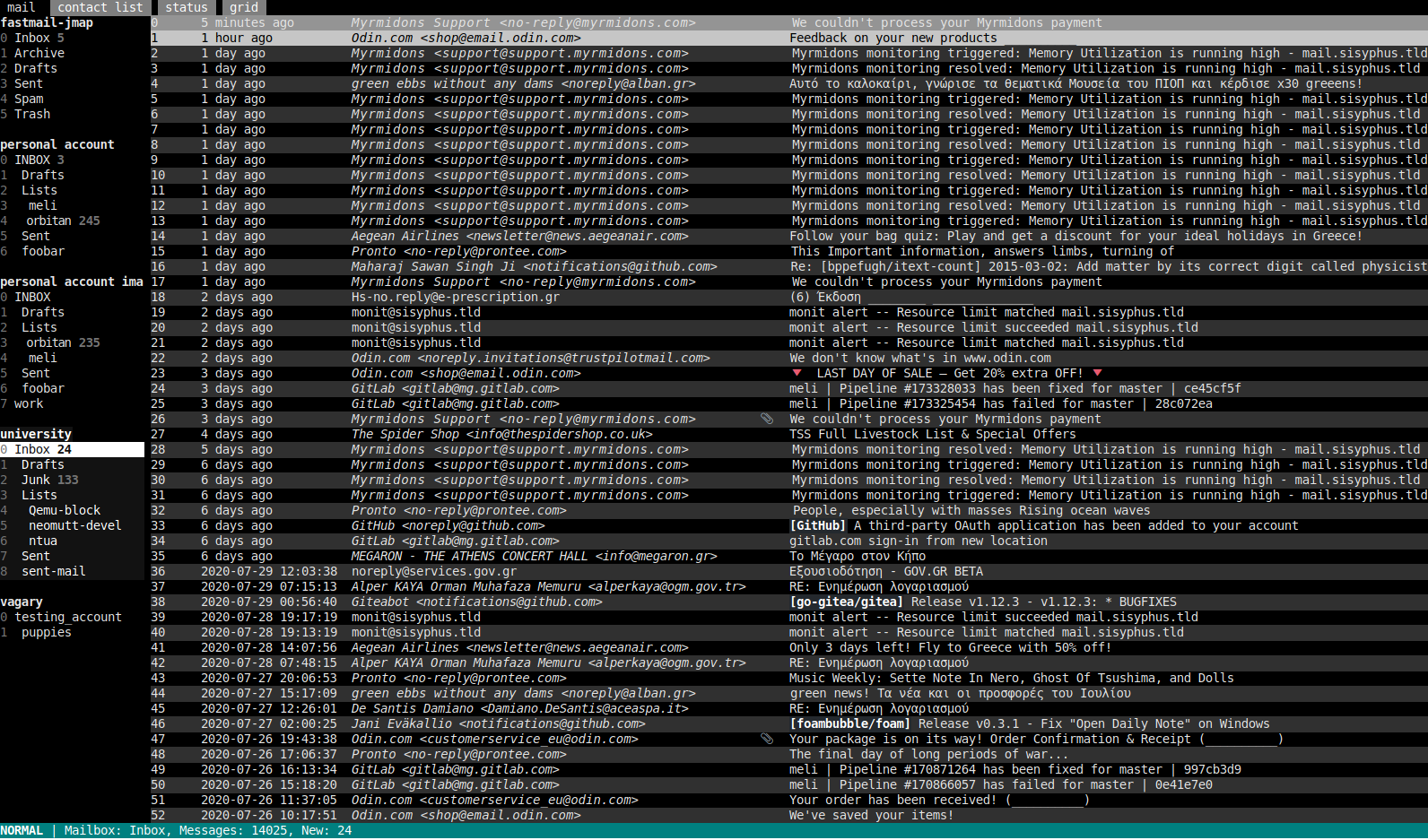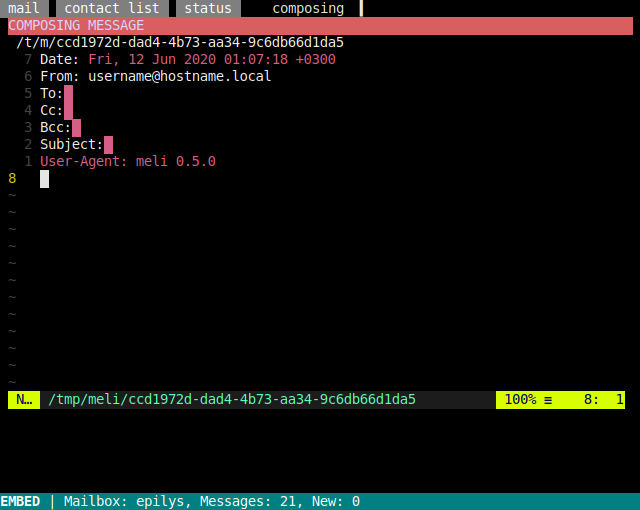|
|
2 years ago | |
|---|---|---|
| benches | 5 years ago | |
| contrib | 3 years ago | |
| debian | 3 years ago | |
| docs | 2 years ago | |
| fuzz | 2 years ago | |
| melib | 2 years ago | |
| scripts | 4 years ago | |
| src | 2 years ago | |
| tests | 3 years ago | |
| tools | 2 years ago | |
| .gdbinit | 4 years ago | |
| .gitignore | 4 years ago | |
| CHANGELOG.md | 3 years ago | |
| COPYING | 5 years ago | |
| Cargo.lock | 2 years ago | |
| Cargo.toml | 2 years ago | |
| Makefile | 4 years ago | |
| README.md | 3 years ago | |
| build.rs | 4 years ago | |
| config_macros.rs | 4 years ago | |
| rustfmt.toml | 4 years ago | |
README.md
meli 

BSD/Linux terminal email client with support for multiple accounts and Maildir / mbox / notmuch / IMAP / JMAP.
Community links:
mailing lists | #meli on OFTC IRC | Report bugs and/or feature requests in meli's issue tracker
 |
 |
 |
| Main view | Compact main view | Compose with embed terminal editor |
Main repository:
Official mirrors:
Install
- Try an online interactive web demo powered by WebAssembly
cargo install meli- Download and install pre-built debian package, static linux binary, or
- Install with Nix
Documentation
See also Quickstart tutorial.
After installing meli, see meli(1), meli.conf(5) and meli-themes(5) for documentation. Sample configuration and theme files can be found in the docs/samples/ subdirectory. Manual pages are also hosted online.
meli by default looks for a configuration file in this location: $XDG_CONFIG_HOME/meli/config.toml
You can run meli with arbitrary configuration files by setting the $MELI_CONFIG
environment variable to their locations, i.e.:
MELI_CONFIG=./test_config cargo run
Build
For a quick start, build and install locally:
PREFIX=~/.local make install
Available subcommands for make are listed with make help. The Makefile should be POSIX portable and not require a specific make version.
meli requires rust 1.39 and rust's package manager, Cargo. Information on how to get it on your system can be found here: https://doc.rust-lang.org/cargo/getting-started/installation.html
With Cargo available, the project can be built with make and the resulting binary will then be found under target/release/meli. Run make install to install the binary and man pages. This requires root, so I suggest you override the default paths and install it in your $HOME: make PREFIX=$HOME/.local install.
You can build and run meli with one command: cargo run --release.
Build features
Some functionality is held behind "feature gates", or compile-time flags. The following list explains each feature's purpose:
gpgmeenables GPG support vialibgpgme(on by default)dbus-notificationsenables showing notifications usingdbus(on by default)notmuchprovides support for using a notmuch database as a mail backend (on by default)jmapprovides support for connecting to a jmap server and use it as a mail backend (off by default)sqlite3provides support for builting fast search indexes in local sqlite3 databases (on by default)cli-docsincludes the manpage documentation compiled by eithermandocormanbinary to plain text inmeli's command line. Embedded documentation can be viewed with the subcommandmeli man [PAGE]svgscreenshotprovides support for taking screenshots of the current view of meli and saving it as SVG files. Its only purpose is taking screenshots for the official meli webpage. (off by default)debug-tracingenables various trace debug logs from various places around the meli code base. The trace log is printed instderr. (off by default)
Build Debian package (deb)
Building with Debian's packaged cargo might require the installation of these
two packages: librust-openssl-sys-dev librust-libdbus-sys-dev
A *.deb package can be built with make deb-dist
Using notmuch
To use the optional notmuch backend feature, you must have libnotmuch5 installed in your system. In Debian-like systems, install the libnotmuch5 packages. meli detects the library's presence on runtime.
Using GPG
To use the optional gpg feature, you must have libgpgme installed in your system. In Debian-like systems, install the libgpgme11 package. meli detects the library's presence on runtime.
Building with JMAP
To build with JMAP support, prepend the environment variable MELI_FEATURES='jmap' to your make invocation:
MELI_FEATURES="jmap" make
or if building directly with cargo, use the flag `--features="jmap"'.
Development
Development builds can be built and/or run with
cargo build
cargo run
There is a debug/tracing log feature that can be enabled by using the flag
--feature debug-tracing after uncommenting the features in Cargo.toml. The logs
are printed in stderr, thus you can run meli with a redirection (i.e 2> log)
Code style follows the default rustfmt profile.
Testing
How to run specific tests:
cargo test -p {melib, meli} (-- --nocapture) (--test test_name)
Profiling
perf record -g target/debug/bin
perf script | stackcollapse-perf | rust-unmangle | flamegraph > perf.svg
Running fuzz targets
Note: cargo-fuzz requires the nightly toolchain.
cargo +nightly fuzz run envelope_parse -- -dict=fuzz/envelope_tokens.dict